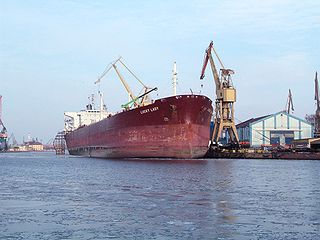
Hedley Byrne & Co Ltd v Heller & Partners Ltd [1964] AC 465 is an English tort law case on economic loss in English tort law resulting from a negligent misstatement. Prior to the decision, the notion that a party may owe another a duty of care for statements made in reliance had been rejected, with the only remedy for such losses being in contract law. The House of Lords overruled the previous position, in recognising liability for pure economic loss not arising from a contractual relationship, applying to commercial negligence the principle of "assumption of responsibility".

Exclusion clauses and limitation clauses are terms in a contract which seek to restrict the rights of the parties to the contract.
A Himalaya clause is a contractual provision expressed to be for the benefit of a third party who is not a party to the contract. Although theoretically applicable to any form of contract, most of the jurisprudence relating to Himalaya clauses relate to maritime matters, and exclusion clauses in bills of lading for the benefit of employees, crew, and agents, stevedores in particular.

The Unfair Contract Terms Act 1977 is an act of Parliament of the United Kingdom which regulates contracts by restricting the operation and legality of some contract terms. It extends to nearly all forms of contract and one of its most important functions is limiting the applicability of disclaimers of liability. The terms extend to both actual contract terms and notices that are seen to constitute a contractual obligation.

Overseas Tankship (UK) Ltd v Morts Dock and Engineering Co Ltd, commonly known as Wagon Mound , is a landmark tort law case, which imposed a remoteness rule for causation in negligence. The Privy Council held that a party can be held liable only for loss that was reasonably foreseeable. Contributory negligence on the part of the dock owners was also relevant in the decision, and was essential to the outcome, although not central to this case's legal significance.

Vita Food Products Inc v Unus Shipping Co Ltd [1939] UKPC 7, is a leading decision of the Judicial Committee of the Privy Council on the conflict of laws. The case stands for the proposition that an express choice of law clause in a contract should be honoured as long as the agreement was bona fide and not against public policy. The case is significant in the field of contract law, as it greatly expanded the ability of parties to choose the jurisdiction of their contacts.

George Mitchell (Chesterhall) Ltd v Finney Lock Seeds Ltd is a case concerning the sale of goods and exclusion clauses. It was decided under the Unfair Contract Terms Act 1977 and the Sale of Goods Act 1979.

English contract law is the body of law that regulates legally binding agreements in England and Wales. With its roots in the lex mercatoria and the activism of the judiciary during the industrial revolution, it shares a heritage with countries across the Commonwealth, from membership in the European Union, continuing membership in Unidroit, and to a lesser extent the United States. Any agreement that is enforceable in court is a contract. A contract is a voluntary obligation, contrasting to the duty to not violate others rights in tort or unjust enrichment. English law places a high value on ensuring people have truly consented to the deals that bind them in court, so long as they comply with statutory and human rights.

Smith v Eric S Bush [1990] UKHL 1 is an English tort law and contract law case, heard by the House of Lords. First, it concerned the existence of a duty of care in tort for negligent misstatements, not made directly to someone relying on the statement. Second, it concerned the reasonableness of a term excluding liability under the Unfair Contract Terms Act 1977, s 2(2) and s 11.

Hollier v Rambler Motors (AMC) Ltd[1971] EWCA Civ 12 is an English contract law case, concerning the incorporation of terms into a contract and the contra proferentum rule of interpretation. It shows an example of a very hostile interpretation of exclusion clauses.
Interpreting contracts in English law is an area of English contract law, which concerns how the courts decide what an agreement means. It is settled law that the process is based on the objective view of a reasonable person, given the context in which the contracting parties made their agreement. This approach marks a break with previous a more rigid modes of interpretation before the 1970s, where courts paid closer attention to the formal expression of the parties' intentions and took more of a literal view of what they had said.

HIH Casualty and General Insurance Ltd v Chase Manhattan Bank[2003] UKHL 6 is an English contract law case concerning misrepresentation.
Unfair terms in English contract law are regulated under three major pieces of legislation, compliance with which is enforced by the Office of Fair Trading. The Unfair Contract Terms Act 1977 is the first main Act, which covers some contracts that have exclusion and limitation clauses. For example, it will not extend to cover contracts which are mentioned in Schedule I, consumer contracts, and international supply contracts. The Consumer Rights Act 2015 replaced the Unfair Terms in Consumer Contracts Regulations 1999 and bolstered further requirements for consumer contracts. The Consumer Protection from Unfair Trading Regulations 2008 concerns certain sales practices.
Afrox Healthcare Ltd v Strydom, an important case in South African contract law, was heard in the Supreme Court of Appeal (SCA) on May 13, 2002, with judgment handed down on May 31.
First National Bank of SA Ltd v Rosenblum and Another is an important case in South African contract law, heard in the Supreme Court of Appeal (SCA) by Marais JA, Navsa JA and Chetty AJA on May 21, 2001, with judgment handed down on June 1. Counsel for the appellant was MD Kuper SC ; PM Wulfsohn SC appeared for the respondents.
In Pete's Warehousing and Sales CC v Bowsink Investments CC, an important case in the South African law of lease, Pete's Warehousing and Bowsink Investments entered into an agreement of lease in terms of which Pete's Warehousing hired certain premises from Bowsink Investments for use as a storage warehouse.
Gillespie Bros & Co Ltd v Roy Bowles Transport Ltd [1973] 1 QB 400 is an English contract law case, concerning the interpretation of unfair contract terms.

Alderslade v Hendon Laundry Ltd [1945] KB 189 is an English contract law case, concerning the construction of exemption clauses, and the contra proferentem principle.
Norwich City Council v Harvey is a 1989 English law case on the waiver of liability in negligence.

Walsh v Jones Lang Lasalle Ltd [2017] IESC 38, is a decision of the Irish Supreme Court in which the court held that a purchaser bears the risk of reliance on erroneous information unless the vendor has clearly assumed responsibility for its accuracy. In reaching this decision, the court clarified the law in Ireland "in relation to the effect of statements disclaiming liability in actions claiming negligent misstatement."










